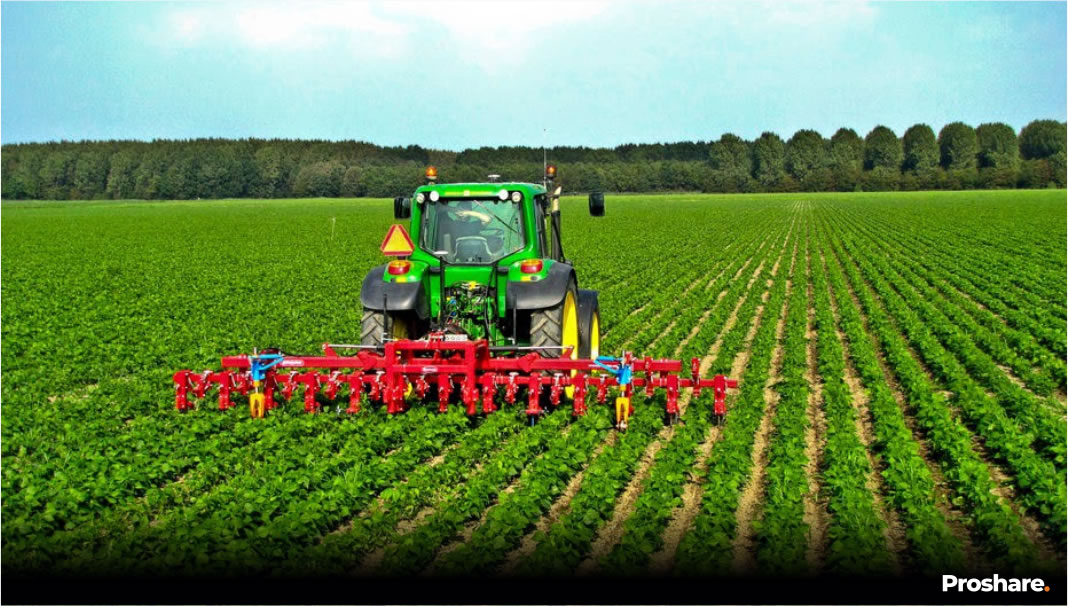Agricultural entrepreneurship, sometimes known as agripreneurship, is the marketing and production of various agricultural goods and inputs. Agripreneurship aims to help farmers and agricultural companies by enhancing production methods and increasing market engagements. It can also help with social and economic development, poverty reduction, and ensuring excellent nutrition and food security. Furthermore, it can contribute to the diversification of the economy and income sources, as well as the creation of jobs and entrepreneurial prospects.
The agripreneurship value chain is one of Nigeria's most important economic activities. According to the National Bureau of Statistics, agro-allied activities account for about 25% of the Nigerian economy's gross domestic product, while the agriculture sector employs roughly 70% of the Nigerian labor force. Listed below are some examples of underexploited agripreneurship opportunities in Nigeria. They include:
• Snail Slime
• Egg powder
• Tomato Paste
Snail Slime
In recent years, the use of snail slime has grown in the beauty and nutraceutical industries. Snail slime is a fluid produced from the locomotor system of a snail. It has the unique property of keeping the skin constantly hydrated and protected from harm. Given the demand for snail slime, significant profits can be earned by exporting it to manufacturing firms in other countries. According to Global Newswire, the global snail beauty products industry was worth $3.7 billion in 2019 and is expected to reach $12 billion by 2029.¹ This surge in demand is related to middle-aged women's rising interest in grooming, the expansion of snail farming, and a shift in preference toward natural skin-improving ingredients. Agripreneurs can export snail slime to foreign cosmetic manufacturing companies in countries like Switzerland and Korea. The capacity to cultivate large-sized snails and the availability of cheap labor in Nigeria could give Nigeria’s slime export business a competitive advantage, as the extraction of slime from snails is a labor[1]intensive process.
Egg Powder
Nigeria's poultry industry has made great strides in the past decade, developing into a highly organized and productive industry. Nigerian poultry farmers typically have a glut between February and May each year, as fewer eggs are consumed during the rainy season. This results in egg waste, as eggs have a short shelf life. Egg powder is highly useful for extending the shelf life and making storage and use easier. It is quite stable at room temperature and can be stored for an extended period of time. Egg powder is used in fast food, ice cream, cakes, cookies, noodles, and doughnuts, among other things. However, less than 5% of the country's egg powder demand is met by domestic manufacturing and there are only two egg powder plants in Nigeria, in Ogun and Osun states. Instead, Nigeria spends about $1 billion yearly on egg powder imports.² Yet, the egg powder plant in Ondo state alone is expected to earn over $1 billion in foreign exchange savings for the country, as well as improved revenue for poultry producers.³ If the country has a sufficient number of functional egg powder production enterprises, competition may drive down prices, encouraging industries to use locally produced egg powder and so minimizing the egg glut.
Tomato Paste
Tomato paste is concentrated tomatoes. The tomatoes are cooked down, then strained to remove the seeds and skins, and then further cooked down until they are incredibly dense. Nigeria produces about 1.8 million metric tons worth of tomatoes in a year and about 40% is wasted due to poor storage and processing facilities.⁴ Meanwhile, Nigeria imports about 189.5 metric tons worth of tomato paste.⁵ Many of the tomatoes grown in Nigeria are lost in transportation when travelling from northern farms to southern markets. These losses can be reduced or eliminated entirely if greater investments are made in producing tomato paste in the north, close to where tomatoes are farmed. This is an opportunity for agripreneurs that would not only reduce waste but increase food security and reduce Nigeria’s reliance on imports.
Some Innovative Agripreneurship Businesses in Nigeria
Kerekusk Rice
Kerekusk Rice is the second largest rice farm in Nigeria. Kereksuk produces over 8,000 metric tons of excellent paddy rice for major milling firms throughout Nigeria each year. It employs over 600 peopl from Nassarawa State and is attemptting to equadruple its output. Nigerians consume more than five million metric tons of rice each year, with the majority of the rice coming from other nations. Kereksuk aims to aid the nation's economy by reducing the need for imported rice through the availability of quality rice made in Nigeria.
Thrive Agric
Thrive Agric was founded in 2017 with the objective of assisting smallholder farmers in gaining access to products and services that farmers do not generally have access to. They deliver goods and services in rural areas and collaborate with other agricultural organizations to reach a wider audience. More than 140,000 smallholder farmers in Nigeria have boosted their ability to meet supply as a result of their efforts.
Farmcrowdy
Farmcrowdy is a global agritech company focused on solving inefficiencies in the food value chain. Farmcrowdy business approach makes use of technology to provide stakeholders with simple access to aggregate farm outputs, inputs, and processed food. They provide premium value to food value chain stakeholders. Their objective is to be Nigeria’s premier Agtech company, promoting sustainability in the global food chain.
Next steps for Nigeria
More than half of Nigeria's workforce is employed in the agricultural sector, either directly or indirectly.⁶ This suggests that agribusiness has the potential to reduce the country's unemployment rate and improve its contribution to the GDP. To properly capitalize on the potential of agribusiness in Nigeria, the Nigerian government should launch an aggressive agribusiness development campaign. The launch of this campaign should emphasize the benefits agribusiness investment with the ultimate objective of increasing agricultural outputs. Some of the areas that require attention for agribusiness to grow in Nigeria include:
1. The development of roads, markets, storage facilities, processing facilities which will all bring about infrastructural development in Nigeria. The development of infrastructures will ease the activities of agripreneurs.
2. Increased participation in agriculture and agribusiness which would result in poverty reduction and relative improvement in food security for families across the country.
 Lagos, NG • GMT +1
Lagos, NG • GMT +1











 404 views
404 views














 Sponsored Ad
Sponsored Ad
 Advertise with Us
Advertise with Us









